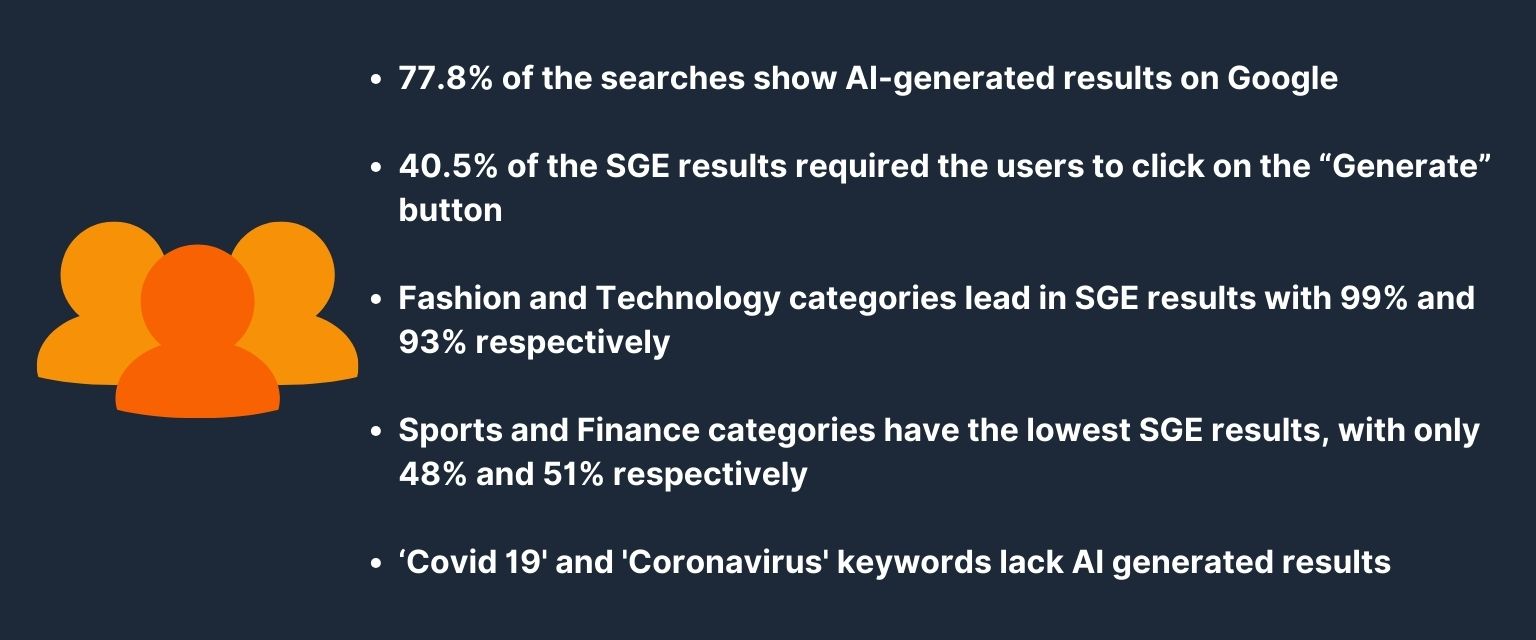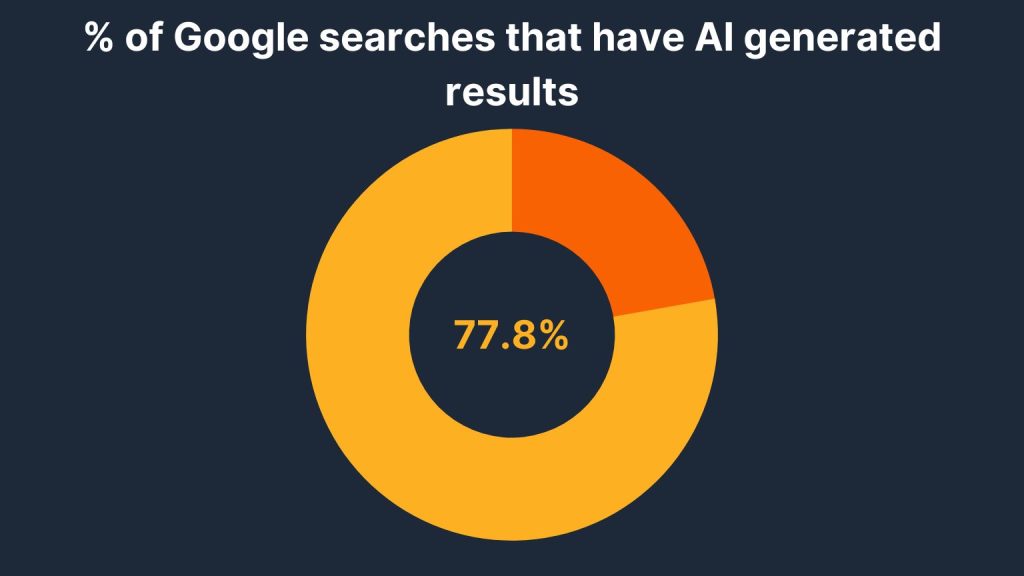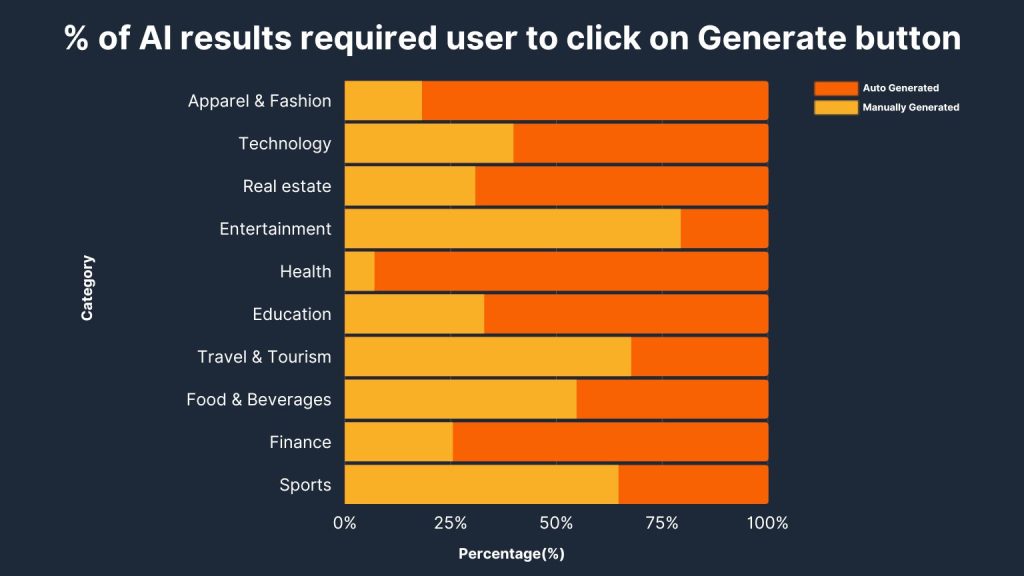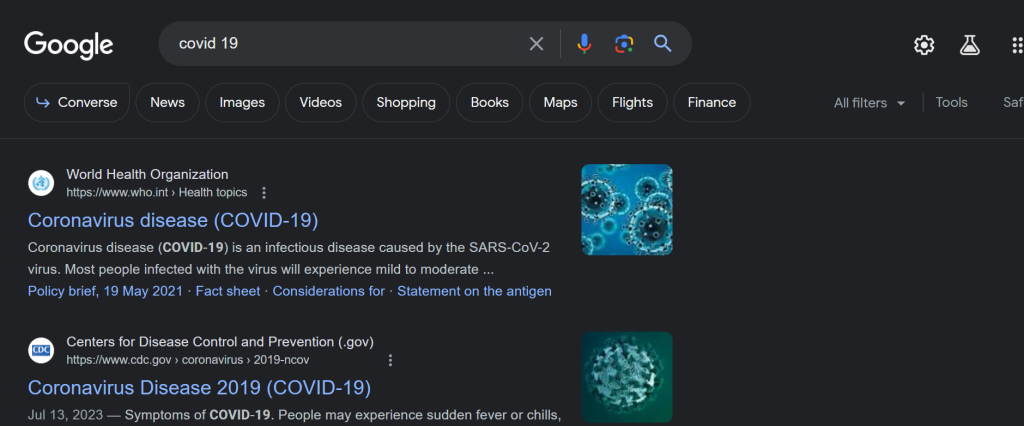In May 2023, Google launched Search Generative Experience (SGE) to enhance Google search with Generative AI.
We conducted a comprehensive study across various categories using SGE-enabled searches. 77.8% displayed AI results, with 40.5% of those requiring user to click on the Generate button.
Fashion and Technology category results have AI results at 99% and 93% respectively, but Sports and Finance are at 48% and 51%. Surprisingly, the Health category also has 86% of the results have AI generated.
Google SGE Searches – Key Statistics

- 77.8% of the searches show AI-generated results on Google
- 40.5% of the SGE results required the user to click on the “Generate” button
- Fashion and Technology categories lead in SGE results with 99% and 93% respectively
- Sports and Finance categories have the lowest SGE results, with only 48% and 51% respectively
- Popular keywords related to “covid 19” or “coronavirus” do not have AI-generated search results
77.8% of Google Searches have AI-Generated SGE Results

A significant 77.8% of the searches showcased AI-generated results. Interestingly, a minority of 22.2% of searches did not display the results.
40.5% of AI Generated Results Required Users to Click the “Generate” Button

Among the AI-generated results, 40.5% required users to click on the Generate button to generate an AI response. The remaining 59.5% of the results were auto-generated.
SGE Results Breakdown by Categories

| Category | % of Results has AI |
|---|---|
| Apparel & Fashion | 99% |
| Technology | 93% |
| Real Estate | 91% |
| Entertainment | 87% |
| Health | 86% |
| Education | 85% |
| Travel & Tourism | 74% |
| Food & Beverages | 64% |
| Finance | 51% |
| Sports | 48% |
% of AI Results Required User to Click on Generate Button

| Category | % of Results Require Click on Generate Button | % of Results Auto Generated |
|---|---|---|
| Apparel & Fashion | 18.2% | 81.8% |
| Technology | 39.8% | 60.2% |
| Real estate | 30.8% | 69.2% |
| Entertainment | 79.3% | 20.7% |
| Health | 7.0% | 93.0% |
| Education | 32.9% | 67.1% |
| Travel & Tourism | 67.6% | 32.4% |
| Food & Beverages | 54.7% | 45.3% |
| Finance | 25.5% | 74.5% |
| Sports | 64.6% | 35.4% |
The Fashion & Technology Category Leads SGE Results Whereas Sports & Finance Have The Lowest SGE Results

| Category | % of Results with SGE |
|---|---|
| Apparel & Fashion | 99% |
| Technology | 93% |
| Sports | 48% |
| Finance | 51% |
Fashion and Technology categories led the way with AI results at 99% and 93% respectively. On the other side, Sports and Finance only managed to get 48% and 51% AI results respectively.
93% of Health and 81.8% of Fashion Searches Show Prominent Auto-Generated Results

| Category | % of SGE Auto Generated Results | % of SGE Manually Generated Results |
|---|---|---|
| Apparel & Fashion | 81.8% | 18.2% |
| Health | 93% | 7% |
The “Health” and “Apparel & Fashion” categories primarily offer auto-generated answers through Google’s SGE.
- Health: Google prioritizes giving immediate health information, which can be vital for users
- Apparel & Fashion: The ever-changing nature of fashion might be why AI frequently provides direct answers, helping users keep up with the latest trends
Health surprises: Health is a serious topic, but Google’s AI still gave answers 86% of the searches. But, it didn’t give answers for more serious topics like ‘COVID-19’ and ‘Coronavirus’.
79.3% of Entertainment and 67.6% of Travel & Tourism Searches Required Manually Generated AI Results

| Category | % of SGE Manually Generated Results | % of SGE Auto Generated Results |
|---|---|---|
| Entertainment | 79.3% | 20.7% |
| Travel & Tourism | 67.6% | 32.4% |
Both the “Entertainment” and “Travel & Tourism” categories often require users to prompt the AI for answers.
- Entertainment: Given the vast world of movies, music, and celebrity news, AI might need clearer user input to offer precise results
- Travel & Tourism: The travel industry, especially in a post-pandemic world, has many variables. Users might have specific and varied queries, leading to AI needing more clarity before generating an answer
No AI Answers For COVID-19 Queries

When people search for “covid” or “coronavirus” on Google, it doesn’t provide AI-generated results.
It seems Google might be prioritizing verified information sources or ensuring accuracy for critical medical queries.
Our Methodology
Selection:
Using the SEO tool Ubersuggest, we extracted keywords from 10 distinct categories, primarily based on high search volumes. Each category yielded 100 unique keywords, resulting in a total of 1,000 keywords.
Study:
After compiling our list of 1,000 keywords, we manually conducted searches for each on the U.S. version of Google. Our main goal was to see how often Google’s Generative AI showed up for these searches.
Detailed Data
- Analysis date: 18th September, 2023
- Total keywords analysed: 1,000
- Keywords displaying Generative AI results: 778 (77.8%)
- Keywords without Generative AI result: 222 (22.2%)
- Out of the 778 AI responses:
- Auto-generated: 463 (59.5%)
- Required user interaction (via “generate” button): 315 (40.5%)
For a detailed breakdown of each keyword and its corresponding Generative AI result in our study, click here.
How To Enable The SGE Option For Generative AI In Google Search?
- Open Google Chrome and sign in.
- At the top right, you’ll see a “Search Lab” icon next to Images. Click it.
- A window will pop up asking you to turn on the SGE feature. Click “Enable”.
- Then, they’ll show some terms and conditions. Click “I Agree”.
- Finally, click “Try an Example” and search for anything.
Give it a try and see how it works for you!
Conclusion
Our comprehensive analysis of 1,000 manual searches in the US has provided clear insights into the adoption of Google’s Generative AI in search results. An overwhelming (77.8%) of these searches displayed AI results. However nearly a quarter (22.2%) did not. Furthermore, of the AI results, 59.4% were auto-generated, while 40.5% required users to click for AI-generated content.
Fashion had a high 99% AI results and Technology followed closely with 93%. In contrast, Sports and Finance had fewer, with only 48% and 51% respectively. We were surprised by the Health category, which had 86% AI results. We thought health topics were too complex for AI, but we didn’t expect so many AI results
If you have questions or need further information, please feel free to contact us.